Survey of Web Browsers for Windows Mobile
My name is Jim Causey, and I work on Core OS developer documentation for Windows Mobile. I’ve been working as a Windows developer in both higher education and private industry for 15 years, and have worked as a writer and editor for SAMS, Microsoft Press, and now Microsoft for most of that time. You can find out more about me at my MSDN blog, Far Pointer.
One of the things I like best about owning a Windows Mobile phone (a Samsung BlackJack II running Windows Mobile 6.1) is the diverse ecosystem of developers writing apps for my device. Whenever you have a strong developer community, you find a range of alternatives to match the way you like to work and play. When it comes to Web browsers for Windows Mobile, there are a number of options other than Microsoft’s Internet Explorer Mobile. Let’s look at a few of the browsers out there today, and one that’s in development.
Skyfire
Skyfire uses the Gecko rendering engine from Mozilla, and loads and renders all content on Skyfire Labs’ servers; this allows the browser to correctly render any Web page you could normally view on a PC, including sites using Silverlight, Adobe Flash, Apple’s QuickTime, and other technologies. Skyfire compensates for a mobile device’s small screen by letting you scroll and zoom selectively on the page.
The screen shot below shows the Skyfire splash screen from my BlackJack II:
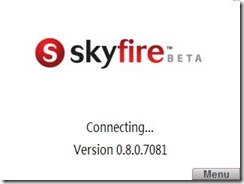
Because Skyfire doesn’t report itself to sites as a mobile browser, you get the full desktop version of each page that you visit. I’ve had great luck using Skyfire on my Q9H and BlackJack II; I’ve used it for everything from playing with Facebook to accessing my online bank statements to watching TV shows at Hulu.com!
Here’s the root page for Ars Technica as rendered by Skyfire:
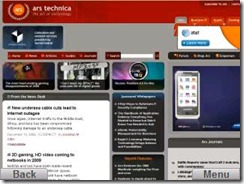
As you can see, it’s rendering all the content, including the Flash ad at the right. The next screenshot shows the page zoomed in by two levels:

Next, I went to YouTube to pull up the Dramatic Chipmunk video; I zoomed in so you could see his beady little eyes:

Next, time to watch some Battlestar Galactica (the classic series) on Hulu.com:

…and a zoomed-in version of the same episode:

Performance is quite good… in fact, Laptop Magazine recently held a Mobile Browser Showdown where Skyfire proved faster than either Opera Mobile or Safari on the iPhone. I’ve seen occasional rendering delays in scrolling around a page, but nothing I wouldn’t expect from pre-release software.
Skyfire is available for free from Skyfire Labs by joining the company’s public beta program; as of today, the current version is Beta 0.8.5.
Opera Mini and Opera Mobile
Opera Software has also brought their popular Web browser to Windows Mobile with two products: Opera Mini and Opera Mobile.
Opera Mini is available as a free download from Opera Software. Opera Mini is a Java application, and works by downloading and rendering content remotely. The current version, Opera Mini 4.2, also features Opera Link, which synchronizes your bookmarks and other personal customizations between Opera running on your desktop, or even on other mobile devices running Opera Mini. Opera Mini is also skinnable, letting you choose from a range of attractive looks for the browser UI. Opera Mini doesn’t seem to let you view the same wide range of rich content as Skyfire; for example, YouTube only currently works on Opera Mini on phones from Sony Ericsson and Nokia.
The first step in running Opera Mini is to find where it has installed; on my BlackJack II, I had to run the Java launcher in order to find it:
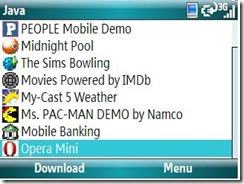
Next, you’ll see the splash screen:

And, for the sake of parity, the Ars Technica home page:

As you can see, Opera Mini isn’t loading the Flash ad on the right. Finally, I zoomed in to read the text:
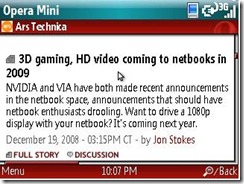
Opera Mobile is Opera’s premier mobile Web browsing solution, and the latest release version (8.65) is available for individual purchase as well as being bundled by Mobile Operators with their phones. You can also try the beta of Opera Mobile 9.5 for free.
Unlike Opera Mini, Opera Mobile is a full-featured Web browser, and downloads and renders all content locally. Opera Mobile defaults to a full-page Web view, and lets you scroll and zoom as needed. Opera Mobile also features multi-tab browsing and Opera’s Dragonfly tools for Web development and debugging. Finally, Opera Software boasts that Opera Mobile is one of the fastest Mobile browsers available. Here’s the Opera Mobile splash screen:
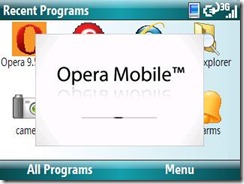
Opera Mobile is designed for touch-screen devices, and doesn’t work terribly well on my BlackJack II. I did, however, manage to wrestle the device into giving me the following Opera Mobile screenshot with Ars Technica so you can see a comparison:

Fennec (Firefox for Mobile)
Fennec is Mozilla’s code name for their effort to port Firefox to mobile devices, including Windows Mobile. Brad Lassey, the lead developer on the Fennec project, has posted a series of blog articles about getting Fennec up and running in a Windows Mobile emulator.
Fennec is still under development, so there aren’t any Windows Mobile builds available for download yet. You can, however, preview Fennec by running an early developer release (Alpha 1, as of today) on your Windows, Mac OS X, or Linux desktop. This screen shot shows the Ars Technica page running in Fennec on my Windows Vista SP1 box:

Fennec has a cool interface that lets you drag to the right to see all your current tabs:
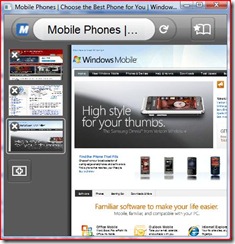
…and drag to the left to see your available controls:
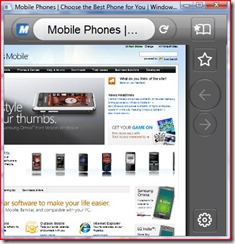
Additionally, because Fennec is an open-source project, developers can try their hand at building Fennec for Windows Mobile themselves.
I’ve been an avid Firefox user on my Windows machines for years now, so I’m eagerly awaiting broader availability of a Fennec build for Windows Mobile.
Comments
Anonymous
January 05, 2009
Yeah, I think it was on this blog, or the Ch10 blog, where I heard about Skyfire and have used it ever since. I use IE for my MSN and Windows Live Mobile browsing, but Skyfire for other "regular" site browsing. It's fast and very complete.Anonymous
January 05, 2009
I can't help noticing you are promoting browsers other than the recently announced IE Mobile 6. Is there a focus shift we should know about?Anonymous
January 06, 2009
I cannot believe people use Skyfire. They are rendering the web pages in their datacenter. That means, every site you visit, every data you enter - is going through their datacenter. We assume that also means they terminate their SSL sessions in their datacenter. So things that you enter for home banking, healthcare, or any government or commercial business - is being run through their application engine - and viewable by any of their employees, or anyone who might compromise their datacenter. Not only that - but you have to log in to use their browser application so they can see all your data, and are able to uniquely identify the browser as you! Not good...Anonymous
January 06, 2009
No focus shift -- just highlighting the variety of applications available for Windows Mobile.Anonymous
January 06, 2009
The same security problems occur with Opera Mini. All the traffic is routed through the Opera server. Furthermore I don't understand why Opera Mini and Skyfire are reviewed under the title web browsers. Both applications are input and output devices and the rendering of pages happens on the server whereas web browsers have the rendering engine on the device.Anonymous
January 06, 2009
@ttklf4 It's included because it's not really about what happens in the background, but ultimately what the user sees... web pages. To a dumb user like me, I don't know that it's going through their servers except that everything happens really fast compared to Pocket IE, Opera Mobile, and NetFront. @Security You log into Skyfire to retrieve your bookmarks. There is no need to log in if you don't need this feature. As for security, stay away from Skyfire and Opera Mini if you are going to retrieve sensitive material.Anonymous
January 06, 2009
I use Net Front on my HTC X7500 winmo 6.1 and it's a great browser for my 5` screen. IE6 is good too for some sites that Net Front has trouble with which is not many. I used Skyfire for ten mins until I deemed it a security nightmare waiting to happen.Anonymous
January 06, 2009
@Matt Forrest: I've found Netfront highly finger-unfriendly. In my large test of all current Windows Mobile Web browsers ( http://www.smartphonemag.com/cms/blog/9/full-roundup-browsing-web-windows-mobile-just-iphone-incl-iem6-review ), I've explained why I consider it probably the least finger-friendly of the entire bunch. Do you use your Athena in finger-scrolling mode a la the iPhone?Anonymous
January 06, 2009
@ttklf4: IMHO, it's pretty undestandable these two browsers are reviewed here. They're, after all, excellent and hugely popular in the WinMo community - for reason. In my roundup, they were also finalists in the "top three" browsers.Anonymous
January 06, 2009
@Security: if you feel unsafe about SkyFire (Opera Mini), then, visit the pages you consider unsafe in an alternative browser using direct connections: NetFront, Opera Mobile, PIE/IEM etc and only do the rest in SkyFire (Opera Mini).Anonymous
January 06, 2009
Don't forget about Iris from Torchmobile. Based on webkit, it's coming along quite well.Anonymous
January 07, 2009
Yup, iris isn't bad - but still a far cry away from any of the more established browsers (most importantly, the two Operas and SkyFire). I've very thoroughly compared the latest version to all the other browsers available for WinMo (and iPhone) - see my above article if interested.Anonymous
January 07, 2009
The comment has been removedAnonymous
January 08, 2009
The comment has been removedAnonymous
January 08, 2009
http://www.mozilla.org/projects/fennec/1.0a2/releasenotes/ I'm not sure why this article links to the old Alpha 1 of Fennec when Alpha 2 has been available since last month.Anonymous
January 08, 2009
How ironic that the very company who argues that the browser is part of the OS is the company that lacks a decent built-in browser on its mobile platform, and has to rely on third parties to improve on it. Hello, Microsoft? Can you just use WebKit already? And can you do something about all that 80's technology still bogging down WinMo development? This is really getting silly. Spill the WinMo7 beans already, MS.Anonymous
January 08, 2009
@Roberto, exactly. Indecidentally, in my 2007 edition of the MS Smartphone Web Browsing bible, I've even published a huge chart of all the hotkeys of all the button-controllable Web browsers: http://www.smartphonemag.com/cms/blogs/3/2084 . See 1.6 Keyboard shortcuts (in the second part at http://www.smartphonemag.com/cms/blogs/3/2089 ). Direct link to the chart: http://www.winmobiletech.com/072007SPWebBrowsers/chart.html And, guys and gals, don't forget to read my other Web browsing-related articles. Again, start with my last roundup at http://www.smartphonemag.com/cms/blog/9/full-roundup-browsing-web-windows-mobile-just-iphone-incl-iem6-reviewAnonymous
January 08, 2009
Is there any mobile browser that can display a file passed down from my document server as a .cfm file? On my desktop IE will display these courtesy of an Acrobat plug-in I think. On the WinMo side WHAT will work?Anonymous
January 11, 2009
how about Netfront 3.5 Concept Edition? :PAnonymous
January 17, 2009
The comment has been removedAnonymous
January 18, 2009
Opera Mobile has two versions, for Smartphones and for Pocket PC's. The latest ones are 8.65 for Smartphones and 9.5 for Pocket PC's. Pocket PC version doesn't run on Smartphone.Anonymous
February 26, 2009
The comment has been removedAnonymous
March 05, 2009
Most of the sites that I do visit work well under Internet Explorer on my Windows Mobile device. Of those sites that don't work, I just don't visit. I actually prefer Internet Explorer to any of the other peices of software that try to replace it. I just want a simple web browser and Internet Explorer provides that. I don't care for all the flashy stuff that a lot of web page writers put on their web pages these days.Anonymous
July 27, 2009
The Windows Mobile blog has moved. Comments on this blog will be disabled soon. Let's continue these discussions on the new site. http://windowsteamblog.com/blogs/windowsphone/default.aspx http://developer.windowsmobile.com Thanks!